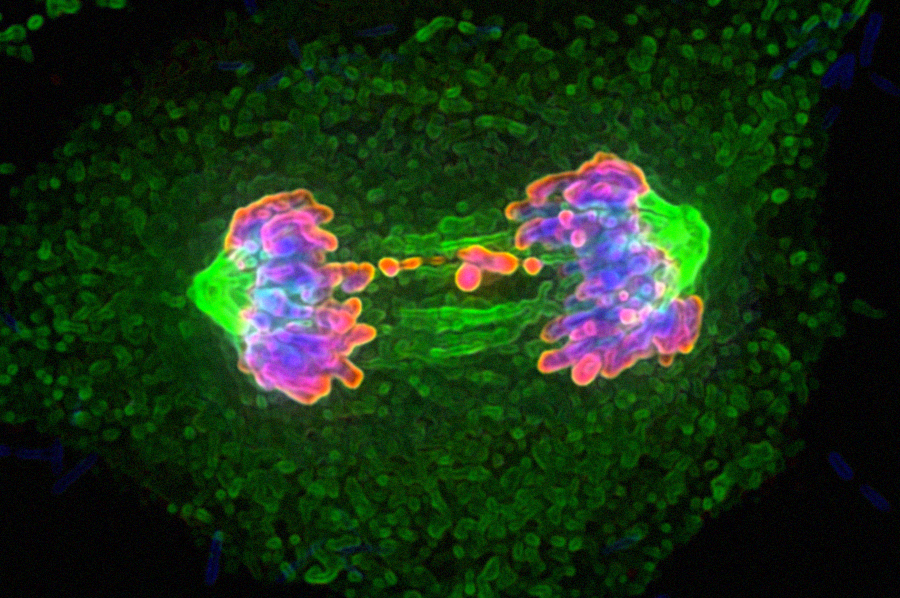Ageing and Aneuploidy
ABOUT
Ageing is a biological process characterized by the progressive deterioration of physiological functions known to be the main risk factor for chronic diseases and declining health. Given the exponential increase of the elderly population and its substantial burden on the health care system, research in ageing biology has become a priority. There has been an emerging connection between ageing and aneuploidy, an aberrant number of chromosomes, even though the molecular mechanisms remain largely unknown. Since 2015, the Ageing & Aneuploidy group has been dedicated to high-profile research on mechanisms of genomic instability contributing to ageing and age-related diseases. Presently, the group applies interdisciplinary approaches to address how regulated instruction of cell cycle fitness and genomic stability decelerates senescence in cellular and mouse models of physiological and accelerated ageing (Hutchison-Gilford Progeria Syndrome and Down syndrome).
RESEARCH
Two major contributions arose from the group’s expertise in combining high-resolution live-cell imaging with advanced molecular/cellular biology techniques to characterize phenotypes of unique cellular models, human trisomic amniocytes [Elife 2015, Sci Rep 2016] and elderly dermal fibroblasts [Nat Commun 2018, Embo Rep 2020]. These studies unveiled chromosomal instability (CIN) as a hallmark in both aneuploid and aged cells. Moreover, we disclosed genetic and pharmacological modulations of ageing-associated CIN as able to delay the senescence pro-inflammatory response. These findings paved the way to our current and future research goals, aiming to deepen the understanding of ageing mechanisms and to test new schemes of healthspan extension in animal models [Nat Aging 2022]. The lab uses omics approaches and functional assays to measure cellular and tissue ageing [BioRxiv 2023].

Team
Selected Publications
In vivo cyclic induction of the FOXM1 transcription factor delays natural and progeroid aging phenotypes and extends healthspan. Nature Aging2(5):397-411, 2022. [Journal: Article] [CI: 41] [IF: 16,6]
DOI: 10.1038/s43587-022-00209-9 SCOPUS: 85129373440
Ferreira F.J., Carvalho L., Logarinho E., Bessa J.
Foxm1 modulates cell non-autonomous response in zebrafish skeletal muscle homeostasis. Cells10(5):, 2021. [Journal: Article] [CI: 9] [IF: 7,7]
DOI: 10.3390/cells10051241 SCOPUS: 85107456993
Vaz S., Ferreira F.J., Macedo J.C., Leor G., Ben-David U., Bessa J., Logarinho E.
FOXM1 repression increases mitotic death upon antimitotic chemotherapy through BMF upregulation. Cell Death and Disease12(6):, 2021. [Journal: Article] [CI: 14] [IF: 9,7]
DOI: 10.1038/s41419-021-03822-5 SCOPUS: 85106857863
Barroso-Vilares M., Macedo J.C., Reis M., Warren J.D., Compton D., Logarinho E.
Small-molecule inhibition of aging-associated chromosomal instability delays cellular senescence. EMBO Reports21(5):, 2020. [Journal: Article] [CI: 30] [IF: 8,8]
DOI: 10.15252/embr.201949248 SCOPUS: 85081638234
Castro A.R., Logarinho E.
Tissue engineering strategies for human hair follicle regeneration: How far from a hairy goal?. Stem Cells Translational Medicine9(3):342-350, 2020. [Journal: Review] [CI: 56] [IF: 6,9]
DOI: 10.1002/sctm.19-0301 SCOPUS: 85077400848
Pereira S.M., Ribeiro R., Logarinho E.
Approaches towards longevity: Reprogramming, senolysis, and improved mitotic competence as anti-aging therapies. International Journal of Molecular Sciences20(4):, 2019. [Journal: Review] [CI: 25] [IF: 4,6]
DOI: 10.3390/ijms20040938 SCOPUS: 85062013237
Barroso-Vilares M., Logarinho E.
Chromosomal instability and pro-inflammatory response in aging. Mechanisms of Ageing and Development182:, 2019. [Journal: Review] [CI: 22] [IF: 4,3]
DOI: 10.1016/j.mad.2019.111118 SCOPUS: 85065928704
Pinho M., Macedo J.C., Logarinho E., Pereira P.S.
NoL12 repression induces nucleolar stress-driven cellular senescence and is associated with normative aging. Molecular and Cellular Biology39(12):, 2019. [Journal: Article] [CI: 15] [IF: 3,6]
DOI: 10.1128/MCB.00099-19 SCOPUS: 85066485467
Macedo J.C., Vaz S., Bakker B., Ribeiro R., Bakker P.L., Escandell J.M., Ferreira M.G., Medema R., Foijer F., Logarinho E.
FoxM1 repression during human aging leads to mitotic decline and aneuploidy-driven full senescence. Nature Communications9(1):, 2018. [Journal: Article] [CI: 103] [IF: 11,9]
DOI: 10.1038/s41467-018-05258-6 SCOPUS: 85050593345
Nicholson J.M., Macedo J.C., Mattingly A.J., Wangsa D., Camps J., Lima V., Gomes A.M., Dória S., Ried T., Logarinho E., Cimini D.
Chromosome mis-segregation and cytokinesis failure in trisomic human cells. eLife4(MAY):, 2015. [Journal: Article] [CI: 82] [IF: 8,3]
DOI: 10.7554/eLife.05068 SCOPUS: 84930649727


